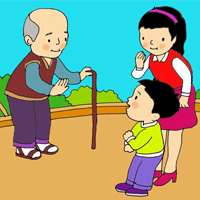Đề thi thử THPT Quốc Gia môn Tiếng Anh năm 2015 sở GD & ĐT Hà Tĩnh
Đề thi thử THPT Quốc gia môn Tiếng Anh có đáp án - Đề thi thử THPT Quốc gia môn Anh
Mời quý thầy cô và các em học sinh tham khảo Đề thi thử THPT Quốc Gia môn Tiếng Anh năm 2015 sở GD & ĐT Hà Tĩnh - trường THPT Trần Phú. Với mỗi đề ôn thi, các em sẽ luyện tập được phương pháp làm bài và ôn tập được từ vựng và ngữ pháp trong suốt 12 năm học.
- Mark the letter A, B, C, or D on your answer sheet to indicate the sentence that is closest in meaning to each of the following questions from 1 to 5.
- Question 1: I’d prefer him not to have said all those embarrassing things about me.
- Question 2: The older he grew the more forgetful he became.
- Question 3: "I will let you know the answer by the end of this week,” Tom said to Janet.
- Question 4: My father’s going to go up the wall when he finds out that I’ve lost the car keys.
- Question 5: I have not experienced such a hurricane as Chanchu since I was a child.
- Mark the letter A, B, C, or D on your answer sheet to indicate the word or phrase that is closest in meaning to the underlined part in each of the following questions from 6 to 8.
- Question 6:
He drives me to the edge because he never stops talking.
- Question 7:
The teacher gave some suggestions on what could come out for the examination.
- Question 8:
I had a row with my boss and had to quit the job.
- Mark the letter A, B, C or D on your answer sheet to indicate the word or phrase that is OPPOSITE in meaning to the underlined part in each of the following questions from 9 to 10.
- Question 9:I can’t stand people who treat animals cruelly.
- Question 10:
The shop assistant have to break off the conversation to serve a customer.
- Read the following passage and mark the letter A, B, C or D on your answer sheet to indicate the correct answer to each of the following questions from 11 to 20.
Stress is our body’s reaction to events or conditions that we cannot easily manage or control. When we are troubled by something, we usually experience some types of (11)_______. There are thousand conditions that (12)______ us to become tense. These may be major and horrible fighting for our lives in a war, being imprisoned or facing death. On the other hand, minor (13)_______ in our daily lives cause stress as well: waiting in lines, taking a quiz, or asking for or accepting a date. Although we usually think of stress as something caused by (14)______ events, pleasant happenings also bring stress.As a new (15)______is done on the effects of stress, new techniques are developed to help (16)______ with anxiety. One aid is to plan for situations that we know will be stressful. Some imagine the event before it happens, thus preparing their minds and bodies (17)______the tension. Others pretend they are on a pleasant beach (18)______ in the sunshine; soon their bodies relax and tension melts away. Other people believe strenuous exercise helps the body handle the problems of daily life. It (19)______ very little which method we use to relax; what does matter is finding the time to temporarily reduce the (20)______ of modern life on our brain and body. - Question 11:
- Question 12:
- Question 13:
- Question 14:
- Question 15:
- Question 16:
- Question 17:
- Question 18:
- Question 19:
- Question 20:
- Mark the letter A, B, C,or D on your answer sheet to show the underlined part that needs correction from 21 to 25.
- Question 21:If either of you take a vacation now, we won’t be able to finish this work.
- Question 22:After writing it, the essay must be duplicated by the student himself and handed into the epartment secretary before the end of the month.
- Question 23:Before she moved here, Arlene had been president of the organization since four years.
- Question 24:Have you learnt the reason why does the water of the ocean becomes blue?
- Question 25:It is difficult to get used to sleep in a tent after having a soft comfortable bed to lie on.
- Mark the letter A, B, C, or D on your answer sheet to indicate the correct answer to each of the following questions from 26 to 30.
- Question 26: _______________ but he also proved himself a good athlete.
- Question 27: Mary encouraged me ____________________ .
- Question 28: When reaching the top of the hill, __________________.
- Question 29: Although it was raining heavily, _________________.
- Question 30: _______________, he gained lots of group-work skills.
- Read the following passage and mark the letter A, B, C or D on your answer sheet to indicate the correct answer to each of the following questions from 31 to 40.
The White House, the official home of the United States president, was not built in time for George Washington to live in it. It was begun in 1792 and was ready for its first inhabitants. President and Mrs. John Adams, who moved in on November 1, 1800. When the Adamses moved in, the White House was not yet complete, and the Adamses suffered many inconveniences; for example, the main staircase was incomplete, which hindered movement from floor to floor, and the future laundry yard was merely a pool of mud, so wet laundry was hung in the unfinished East Room to dry. Thomas Jefferson, the third president, improved the comfort of the White House in many respects and added new architectural features such as the terraces on the east and west ends.When the British forces burned the White House on August 24, 1814, President Madison was forced to leave. All the remained after the fire was the exterior walls, the interior was completely destroyed. It was not until December of 1817 that the following president, James Monroe, was able to move into a rebuilt residence. Since then, the White House has continued to be modified but has been continuously occupied by each succeeding U.S president. - Question 31: Which of the following would be the most appropriate title for this text?
- Question 32: Why did George Washington not live in the White House?
- Question 33: The word “inhabitants” in line 2 is closest meaning to_________.
- Question 34: It can be inferred from the passage that John Adams was_____.
- Question 35: What of the White House was not yet complete when the Adamses moved in?
- Question 36: The author most likely discusses the “staircase” in line 5 in order to _________.
- Question 37: The word “forces” in line 9 could best be replaced by ________.
- Question 38: According to the passage, which of the following best describes Thomas Jefferson’s tenure in the White House?
- Question 39: According to the passage, when James Monroe came to the White House, it had been _______.
- Question 40: The paragraph following the passage most likely discusses _________.
- Mark the letter A, B, C,or D on your answer sheet to indicate the correct answer to each of the following questions from 41 to 65.
- Question 41: Apart from its convenience, one of the biggest ________ of public transport is its unreliability.
- Question 42:- “Don’t fail to send your parents my regards.”
- “___________.” - Question 43: I am considering ______ my job. Can you recommend a good company?
- Question 44: That pipe ______ for ages. We must get it mended.
- Question 45: He never lets anything come ______ him and his weekend fishing trip.
- Question 46: We need to think of _____ our products to meet the need of potential customers.
- Question 47: If Thang hadn’t quarreled with the bad boys at school, he _____ a black eye.
- Question 48: The price of fruit has increased recently, ______ the price of vegetables has gone down.
- Question 49: I really must go and lie down for a while; I’ve got a _______ headache.
- Question 50: _______ students in our class is 45.
- Question 51: The building work must be finished by the end of the month _______ of cost.
- Question 52: ____ did I realize that the burglar was still in the house.
- Question 53: “Can you lend me your fountain-pen?” “_________.”
- Question 54: The roadworks made _______ to the hotel from the main road difficult.
- Question 55: On Tet occasion this year, we had a meeting and decided to _______ to hold a party and invited all the teachers who had taught us at high school.
- Question 56: Her parents were very _____ because she was out so late that night.
- Question 57: He lost the race because he _____ petrol on the last lap.
- Question 58: “Let’s go to Riverton this weekend.” – “Sounds like fun. ____ from here?”
- Question 59: What a busy day it's been, ________?
- Question 60: The doctor gave the patient _____ examination to discover the cause of his collapse.
- Question 61: ___________ of the students in my class could solve the problem yesterday.
- Question 62: There used to be many centenarians on this island, ________ attracted twenty scientists going there last year.
- Question 63: He managed to keep his job ______ the manager had threatened to sack him.
- Question 64: I'll go shopping with you ____ I can get back in time for the lecture at 2 p.m.
- Question 65: The accident was caused by a taxi driver _______ the traffic light.
- Read the following passage and mark the letter A, B, C or D on your answer sheet to indicate the correct answer to each of the following questions from 66 to 75.
Psychologists have debated a long time about whether a child’s upbringing can give it the ability to do outstandingly well. Some think that it is impossible to develop genius and say that it is simply something a person is born with. Others, however, argue that the potential for great achievement can be develop. The truth lies somewhere between these two extremes.
It seems very obvious that being born with the right qualities from gifted parents will increase a child’s ability to do well. However, this ability will be fully realized only with the right upbringing and opportunities. As one psychologist says, “To have a fast car, you need both a good engine and fuel.”
Scientists have recently assessed intelligence, achievement, and ability in 50 sets of identical twins that were separated shortly birth and brought up by different parents. They found that achievement was based on intelligence, and later influenced by the child’s environment.
One case involving very intelligent twins was quoted. One of the twins received a normal upbringing, and performed well. The other twin, however, was brought up by extremely supportive parents and given every possible opportunity to develop its abilities. That twin, though starting out with the same degree of intelligence as the other, performed even better.
This case reflects the general principle of intelligence and ability. The more favorable the environment, the more a child’s intelligence and ability are developed. However, there is no link between intelligence and socioeconomic level of a child’s family. In other words, it does not matter how poor or how rich a family is, as this does not affect the intelligence.
Gifted people can not be created by supportive parents, but they can be developed by them. One professor of music said that outstanding musicians usually started two or three years earlier than ordinary performers, often because their parents had recognized their ability. These musicians then needed at least ten years’ hard work and training in order to reach the level they were capable of attaining.
People who want to have very gifted children are given the following advice:
- Marry an intelligent person.
- Allow children to follow their own interests rather than the interests of the parents.
- Start a child’s education early but avoid pushing the child too hard.
- Encourage children to play; for example, playing with musical instrument is essential for a child who wants to become an outstanding musician. - Question 66: When scientists studied intelligence and ability in twins, they found that ______.
- Question 67: Scientists chose twins for their study because ______.
- Question 68: How were great musicians different from ordinary musicians in their development?
- Question 69: The writer advises that gifted children should be allowed to follow ______.
- Question 70: When encouraging their gifted children, parents should avoid ______.
- Question 71: The remark: “To have a fast car, you need both a good engine and fuel.” in the passage means that in order to become a genius, ______.
- Question 72: The word “favorable” in the passage mostly mean ______.
- Question 73: All of the following statements are true EXCEPT ______.
- Question 74: The upbringing of highly intelligent children requires ______.
- Question 75: The word “others” used in the first paragraph refers to ______.
- Mark the letter A, B, C, or D to indicate the word that differs from the rest in the position of the main stress in each of the following questions from 76 to 78.
- Question 76:
- Question 77:
- Question 78:
- Mark the letter A, B, C or D on your answer sheet to indicate the word that differs from pronunciation in each of the following questions from 79 to 80.
- Question 79:
- Question 80:
- Đáp án đúng của hệ thống
- Trả lời đúng của bạn
- Trả lời sai của bạn








